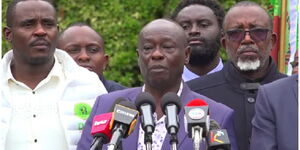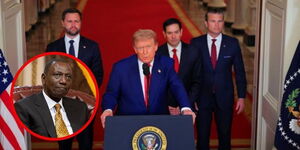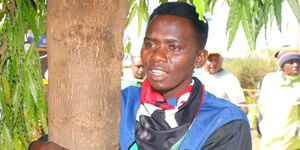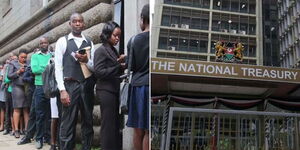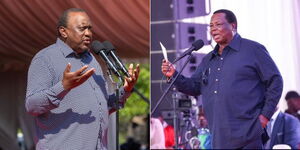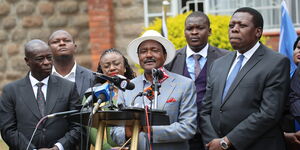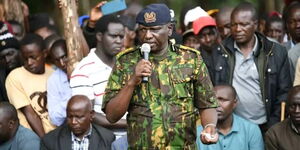In African society, culture is the heartbeat of our passion. It's our song, our dance, our story. It unites us, fuels our spirits, and paints our lives with vibrant colours.
As Africans, we embrace our culture with passion because it embodies our identity, represents how we have been socialised, and anchors us in rich traditions.
It's a source of pride, resilience, and belonging, inspiring us to preserve, celebrate, and pass down our heritage to the generations yet to come.
Even so, it is instructive to note that African culture is slowly being eroded as black people within the continent increasingly warm up to Western mannerisms.
Although those in rural settings have largely kept the spirit of African culture alive, their counterparts in urban areas have over the years gradually moved away from certain traditions, in favour of a more modern and flashier lifestyle.
However, there are those traditions that wealthy Africans, and more specifically, elite Kenyans have stuck to.
Kenyans.co.ke takes a look at some of them.
Traditional Marriages & Ruracios
Very few traditions embody Kenyan love culture like traditional marriages.
Ask any Kenyan about ruracio, and their eyes will light up as they describe the event.
One captivating aspect of the tradition involves a blindfolded man, seeking a woman's hand in marriage, identifying his future bride from a group of women, including the lady's relatives.
Ruracios are not merely ceremonies; they are vibrant celebrations, brimming with joy and familial bonds.
This tradition marks the commencement of a promising journey with one's dream partner, signifying the first step toward a bright and harmonious future together.
When its affluent families involved, the event is even more glamorous.
For instance, the family of Prime Cabinet Secretary Musalia Mudavadi went all out during his daughter Maryanne Mudavadi's traditional wedding held on September 16.
The colourful event was attended by several senior politicians and prominent personalities
Maryanne was getting married to lawyer Nyaga Karanja in a traditional Kuara Itara wedding ceremony.
The Kuara Itara traditional wedding is a popular custom in the Kikuyu Community and is done to allow the bride's family to see their daughter's nesting place being done at the groom's home.
Another perfect example of how prominent families go big on traditional marriages is the case of former President Uhuru Kenyatta's eldest son Jomo who wedded the love of his life Fiona Achola on April 8, 2018.
The wedding was so secretive that no photos were allowed.
Before the actual wedding, the two had held a traditional wedding ceremony in 2016 where Achola got a warm reception at Uhuru’s rural home in Ichaweri, Gatundu, Kiambu County.
Achola was formally handed over to the Kenyattas by her mother, Ruth Omamo.
The event was graced by the presence of her aunt, former Defence Cabinet Secretary Rachelle Omamo.
From the Kenyatta side; Beth Mugo, Kristina Pratt, Nyokabi Muthama, Anna, Pip, and Christine Gakuo also attended.
Achola was escorted to her new home by her relatives, marking the joyous occasion.
Housewarming
Once a man successfully completes the construction of his home, it is a common tradition in many cultures to celebrate this achievement by hosting a housewarming ceremony.
In modern-day society, it is customary for guests to bring symbolic gifts such as salt, wine, and bread to the event.
Guests typically feast on food provided by the host, emphasising the community's support and togetherness during such occasions.
One event that captured this perfectly was the housewarming of Citizen TV journalist Stephen Letoo held on October 13, 2023. in Kilgoris, Narok County.
Letoo, fondly referred to his Thanksgiving ceremony as "Letoo Day."
To mark this momentous occasion, the journalist slaughtered 5 bulls.
Circumcision
Circumcision by virtue of being a rite of passage is a big deal in traditional African society.
For a parent, nothing quite puts a smile than seeing their son finally become a man and finally take the first step towards fending for themselves.
Take the case of National Assembly Deputy Speaker Gladys Boss Shollei who heaped praises on her son in December 2022, after he successfully underwent this stage of life.
Shollei thanked God for guiding her son through the entire process which usually takes ten days.
"With a heart filled with praise and thanksgiving, I celebrated my son's Korom Arap Shollei coming of age. His journey into manhood is complete," Shollei said in a statement.
Chanting for the Dead
The phrase 'lets pay our last respects' is the perfect way to think about why people celebrate the lives of their kin or loved ones after they pass away.
However, people do this differently. Some pray or cry while others invite community members to share good stories about those who have passed away.
One unique way that the Kenyan elite celebrate the deceased is to chant for them.
This is particularly common in the Luo community.
The chant according to Luo elders, is a preserve for fallen greats, including political leaders, coveted industrialists, decorated sportspeople, and religious leaders, among other respected members of the society.
ODM leader Raila Odinga chose a popular Luo dirge to mourn former president Daniel Moi at the late Head of State's burial service held at Kabarak University Grounds on Wednesday, February 12, 2020.
He also honored Kenya's third president, Mwai Kibaki with a chant during the latter's burial ceremony.
Blessing of Elders
Although most Kenyan politicians have taken advantage this tradition for expedience, it is still one of the most cherished among the elite.
Howso?
Rewind to 2012, when Mt Kenya elders held prayers at State House shortly before former President Mwai Kibaki vacated the house on the hill.
The rationale behind the event was to bless the premises before Kenya's 4th President Uhuru Kenyatta took over.
Both Kibaki and Kenyatta came from the Mt Kenya region. The elders believed that blessing State House was a good omen that would bring good luck to the latter throughout the course of his Presidency.
Deputy President Gachagua also held a one-of-a-kind blessing ceremony when he took oath of office.
Eldoret-based Kikuyu elders also endorsed President William Ruto as their preferred presidential candidate in the buildup to the 2022 general election.
Praying Facing the Mountain
In his legacy book; Facing Mt. Kenya, Kenya's founding father Jomo Kenyatta intimated that praying while facing Mt Kenya was a sure way of getting what you yearn for and seek.
The Kikuyu thought the light from the mountain was a manifestation of their God’s power, “Utheri” as such, Kenyatta believed that Mt Kenya was sacred.
The same tradition has been carried over for generations.
In January 2023, Deputy President Rigathi Gachagua trekked to Mt Kenya and prayed while facing the mountain, which he believed would bring an end to the country's drought and set the country on a course towards prosperity.
After the prayers, Gachagua revealed that he prayed to God for increased rainfall and a plentiful harvest for Kenyan farmers.
Bullfighting
Bullfighting is a very common tradition in Western Kenya.
The Luhyas believe the tradition promotes peace among communities, distinguishing it from the Spanish corrida de toros where humans confront bulls.
In Kakamega bullfighting, the animals engage in combat instead of people.
Kakamega Senator, Boni Khalwale is a lifelong enthusiast of the tradition and has even adopted the nickname Bull Fighter.
The event also presents an opportunity for the two strongest bulls to showcase their talents and make their owners a tidy sum.

